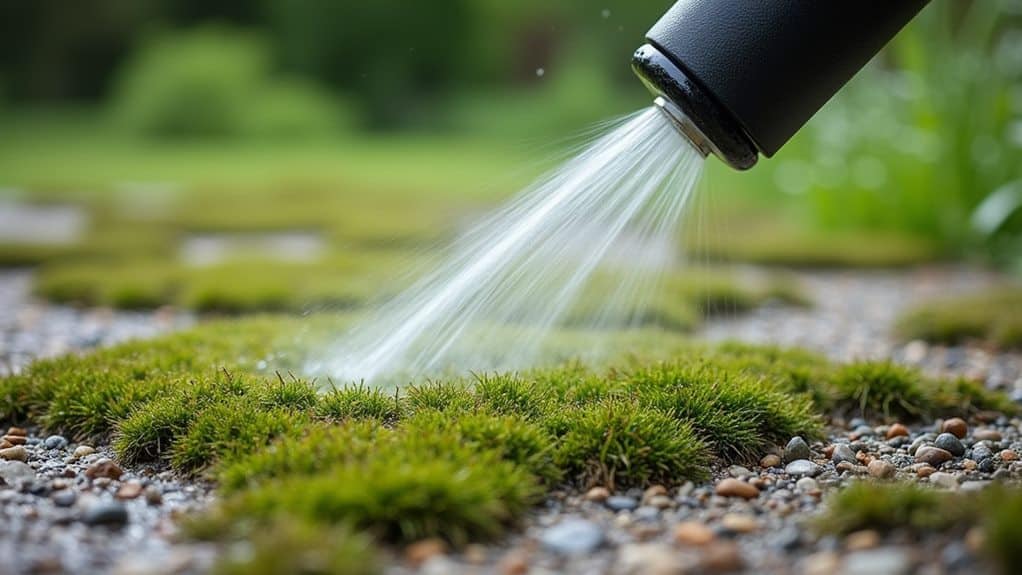Start with a simple sweep using a stiff brush to remove loose moss.
Mix a gentle cleaning solution using sodium percarbonate (40g per square metre) or diluted hydrogen peroxide – both are safe for resin surfaces.
If using a pressure washer, keep it below 150 bar and stick to cold water, holding the nozzle at least 20cm away from your driveway.
Pop on some protective gear – gloves and goggles are essential.
Rather than blasting stubborn patches with high pressure, work them with a medium-bristled brush using circular movements.
For particularly tough spots, it’s worth calling in a professional who’ll have the right kit and know-how.
Key Takeaways
Simple Steps to Clear Moss from Your Resin Driveway
- Use a pressure washer on low setting (max 150 bar) with cold water. Keep the nozzle 20cm from the surface – about a ruler’s length – to safely blast away moss without damaging the resin.
- Sprinkle eco-friendly sodium percarbonate (oxygen bleach) at 40g per square metre – roughly two tablespoons. Let it soak before light scrubbing.
- Keep moss at bay with weekly sweeping using a stiff brush and mild washing-up liquid solution. Just like cleaning your patio furniture.
- Choose dry days for moss removal. Work in gentle circular motions with a medium-bristled brush – think washing-up brush firmness – to protect the surface.
- Apply an iron sulphate treatment once yearly, ideally in autumn. Sort any drainage issues, as standing water is a moss magnet.
Understanding Moss on Resin Surfaces
Moss on Resin Driveways: Essential Facts
Moss commonly appears on resin driveways in Britain, particularly in shaded spots where dampness collects.
Whilst it’s a nuisance, moss only grows on the surface and won’t damage your driveway’s structure. Getting your driveway professionally resealed every 2-3 years creates a robust barrier against moss whilst protecting the resin.
You’ll most often spot moss in shaded areas of your driveway, especially in wet weather.
It’s particularly common in coastal areas and during our cooler months.
Though moss won’t penetrate the resin, it creates two main problems: it makes the surface slippery and spoils the driveway’s appearance.
Regular upkeep is key to keeping moss at bay.
Simple steps like routine cleaning and ensuring proper drainage will prevent moss from taking hold.
Understanding where and why moss grows helps you tackle it effectively – you can then choose cleaning methods that remove the moss without harming your resin surface.
With this knowledge, you can maintain a clear driveway year-round.
Essential Cleaning Tools and Materials
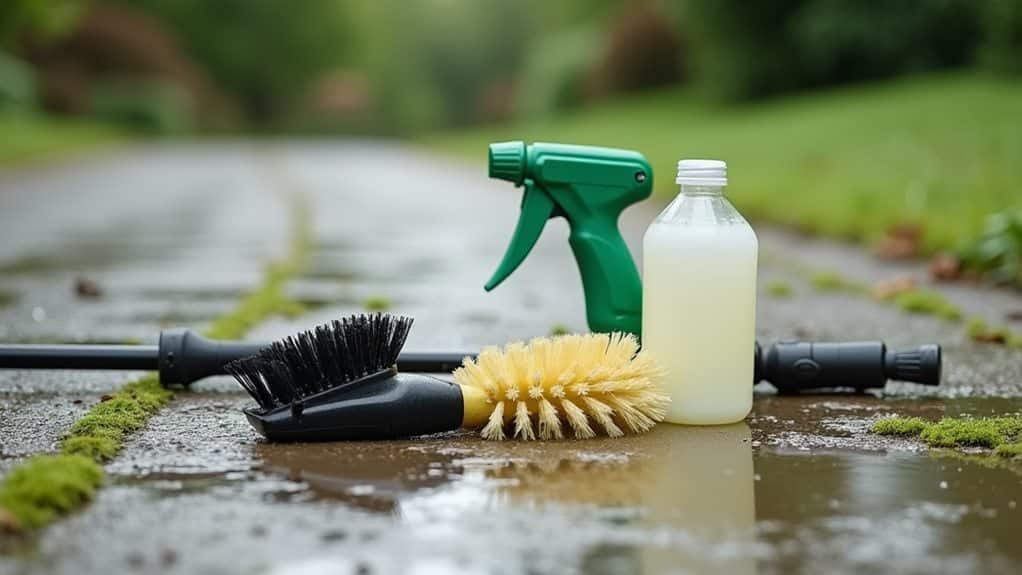
Basic cleaning tools needed: a sturdy broom and pressure washer (150 bar maximum) with a flat spray nozzle for effective moss removal from resin driveways.
Check your driveway monthly – it’s easier to tackle moss early rather than letting it build up.
For cleaning solutions, either mix washing-up liquid with water for light jobs or use specialised iron sulphate moss killer for tough patches.
Always wear protective gloves and goggles when handling cleaning chemicals.
Basic Cleaning Equipment Needed
Essential Cleaning Equipment for Resin Driveways
The right cleaning tools are crucial for moss removal from resin driveways. You’ll need a stiff-bristled broom for sweeping and a pressure washer (maximum 150 bar) with a flat spray nozzle to remove moss without damaging the surface.
| Equipment | Purpose | Specifications |
|---|---|---|
| Pressure Washer | Moss Removal | 150 bar max, flat nozzle |
| Stiff-bristled Broom | Debris Removal | Heavy-duty bristles |
| Protective Gear | Safety | Gloves and goggles |
| Cleaning Supplies | Stain Treatment | Detergent, absorbents |
Mix a mild detergent with water to tackle stubborn stains. Always wear protective gear – gloves and goggles are essential for safe cleaning. Keep cat litter or baking soda handy for oil spills, and use a soft brush for persistent stains to avoid surface damage. This kit covers all bases for effective moss removal and general upkeep of your resin driveway.
Safe Chemical Solution Options
Safe Chemical Solutions for Moss Removal
Several reliable chemical solutions effectively tackle moss on resin driveways. Sodium percarbonate offers an eco-friendly choice – apply 40g per square metre to dissolve moss roots and prevent regrowth.
Regular cleaning with mild detergents between treatments helps keep moss at bay.
Hydrogen peroxide works well as a non-toxic option, breaking down moss and algae without harming the environment. If using bleach, ensure thorough rinsing to protect your resin surface.
A budget-friendly mix of bicarbonate of soda and vinegar creates an effective moss-killing solution by altering pH levels.
Shop-bought moss killers containing iron sulphate work particularly well for stubborn moss problems. Always follow the manufacturer’s instructions carefully to protect your driveway’s surface.
Whichever solution you choose, correct dosage and application are crucial – too much can damage the resin, while too little won’t solve the problem.
Protective Gear Requirements
Essential Protective Gear for Moss Removal
Proper safety gear is crucial when removing moss from resin driveways. Regular maintenance throughout the year helps prevent heavy moss growth and protects your investment.
Start with chemical-resistant gloves to protect your hands whilst working with cleaning solutions. Protective goggles are essential to shield your eyes from splashes and debris.
Always wear a proper breathing mask, especially when using bleach-based solutions or commercial moss killers, as these products give off strong fumes.
Your toolkit should include a sturdy bristled brush for initial scrubbing and a pressure washer with a fan nozzle. Keep the pressure below 150 bar to avoid damaging the resin surface.
Have some old towels or cloths handy to quickly mop up any spills.
Safe Chemical Treatment Options
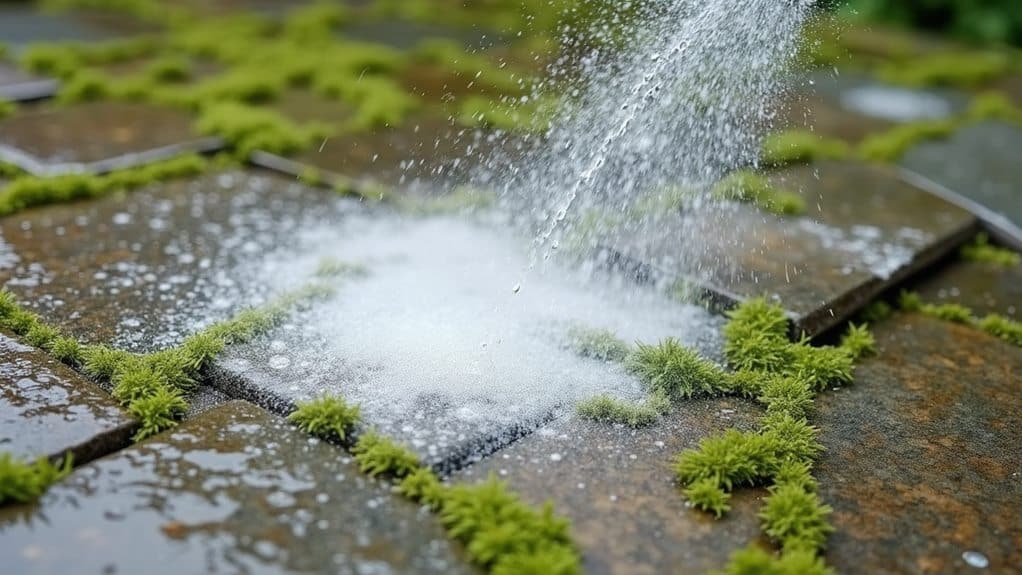
Safe Chemical Treatment Options
Several reliable chemical treatments safely remove moss from resin driveways without harming the surface. With their robust construction and durability, resin driveways can handle most cleaning solutions well.
Sodium percarbonate works brilliantly as an eco-friendly choice, killing moss at its roots whilst being kind to the environment. It’s particularly good at stopping regrowth by destroying both moss and spores.
Hydrogen peroxide offers another safe option, breaking down moss effectively without damaging the resin surface. For targeted treatment, specialist moss killers containing iron sulphate work well whilst protecting your driveway’s finish.
If using bleach, stick strictly to the manufacturer’s guidelines and rinse thoroughly to avoid discolouration.
A simple mixture of vinegar and water serves as an effective homemade solution that won’t harm resin surfaces. This natural approach changes the pH to fight moss whilst maintaining surface quality.
For best results with any treatment, follow proper concentration guidelines and application methods suited to your specific resin driveway.
Pressure Washing Best Practices
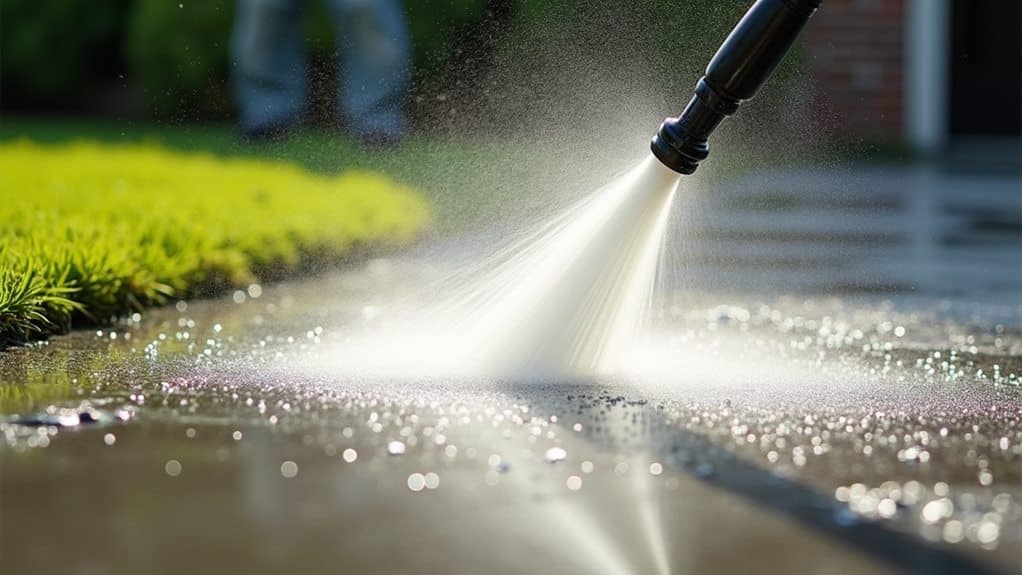
UV-stabilised resins hold up better against routine pressure washing.
For moss removal, fit a flat spray nozzle and always use cold water.
Set your pressure washer to no more than 150 bar – this gives enough power to shift moss whilst protecting your resin surface.
Keep the nozzle at least 20 cm from the surface and use steady, sweeping movements for even cleaning without damaging the driveway.
Equipment Setup and Safety
Safe moss removal from resin driveways requires proper equipment and careful technique. Choose a pressure washer rated at 150 bar maximum to protect your resin surface. Regular cleaning helps maintain durability and prevents moss build-up.
Always fit a flat spray nozzle for even water distribution across the surface. Use cold water only, as hot water damages resin binding. Keep the pressure washer at least 20cm from the surface whilst cleaning to prevent dents and damage.
Check the weather forecast – dry conditions are essential for proper drying and help prevent moss from returning. Work in a systematic pattern across your driveway, maintaining consistent distance and spray angle throughout.
Essential setup checklist:
- 150 bar pressure washer
- Flat spray nozzle
- Cold water supply
- Dry weather conditions
- 20cm minimum distance from surface
Optimal Pressure Settings
Optimal Pressure Settings for Moss Removal
Start with the lowest pressure setting of around 100 bar on your pressure washer, increasing gradually until the moss comes away cleanly without damaging the surface.
Gentle cleaning is crucial for protecting your resin driveway, much like during the initial installation phase. Never go above 150 bar, as this risks serious damage to the resin bonding.
Fit a flat spray nozzle to spread water evenly – think of watering a delicate garden bed rather than using a powerful jet.
Keep the nozzle at least 20cm from the surface whilst cleaning.
Stick to cold water only, as hot water can weaken the resin.
Work in steady, overlapping sweeps across your driveway, similar to mowing a lawn, to ensure you don’t miss any spots.
This methodical approach effectively removes moss while keeping your resin driveway in top condition.
Proper Cleaning Technique
Building on correct pressure settings, proper cleaning technique is crucial for effective moss removal without damaging your surface. For resin driveways, you need careful control of both movements and equipment.
First, fit a flat spray nozzle for even pressure distribution. Keep the pressure washer at 150 bar maximum, using cold, clean water. Stand at least 20cm from the surface – any closer risks damaging the resin bonding.
Work in steady, sweeping movements across the surface, never staying too long in one spot. This ensures thorough cleaning whilst protecting the resin. For stubborn patches, don’t be tempted to increase pressure or move closer – simply make extra passes or tackle it with a stiff brush between washes.
If you’ve got a UV-stable resin surface, it’ll better withstand regular cleaning and keep its colour longer.
Though resin driveways are low maintenance, using the right cleaning technique is essential for their long-term durability.
Manual Scrubbing Techniques
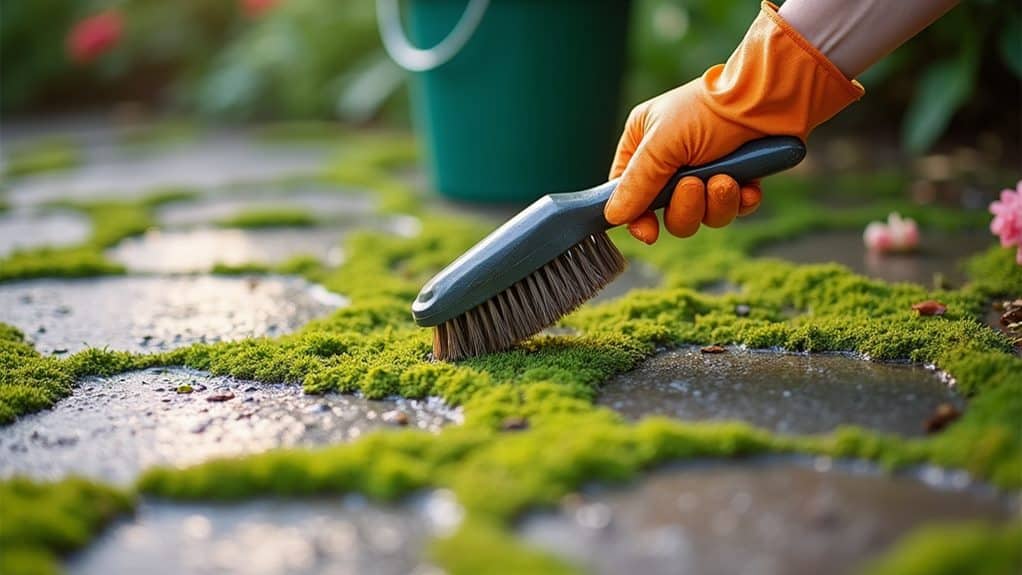
Manual Scrubbing Techniques
For effective moss removal from your resin driveway, use a stiff-bristled brush that’s firm enough to shift the moss without damaging the surface. Whilst resin driveways are quite hardy, it’s best to use moderate pressure to protect the finish. Work steadily across affected areas with consistent pressure.
Mix your cleaning solution before starting. Standard washing-up liquid and water work well for typical moss growth, whilst a vinegar-water mixture tackles more stubborn patches. The vinegar’s acidity helps break down tough moss by changing the pH.
Clean in small sections to ensure you don’t miss any spots. Regular sweeping helps stop moss spores from settling back on your driveway. When tackling existing moss, use circular motions to lift it without scratching the surface.
Always rinse each cleaned section thoroughly with clean water to wash away cleaning products and loose moss bits. This stops any leftover chemicals from harming the resin and prevents new moss growth from taking hold.
Preventative Maintenance Steps
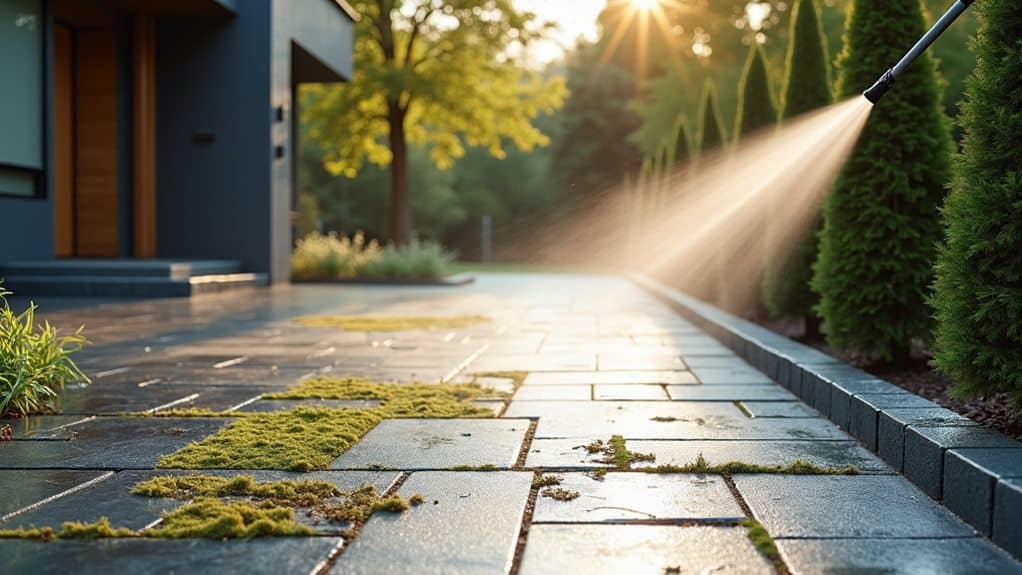
Regular maintenance of your resin driveway starts with weekly sweeping using a stiff-bristle brush to stop moss taking hold.
Get your driveway professionally resealed every 2-3 years for extra protection.
Check drainage regularly to prevent water pooling, as damp spots are prime spots for moss growth.
Cut back any overhanging trees or bushes to let sunlight reach the surface – this naturally keeps moss at bay.
Once a year, apply a quality moss and algae treatment to protect your driveway through all seasons.
Regular Sweeping Schedule
Regular sweeping keeps your resin driveway in top condition and stops moss from taking hold. A weekly sweep with a stiff-bristled brush removes leaves and dirt whilst protecting the surface.
For best results, sweep during dry spells and use washing-up liquid mixed with water between cleans to ward off stubborn stains and moss.
Simply brush with light pressure to shift debris – think of it like sweeping your kitchen floor.
Avoid cleaning in the rain, as wet conditions make it harder to clear debris properly and can leave damp patches where moss loves to grow.
Reduce Shaded Areas
Reducing shaded spots on your resin driveway helps prevent moss from taking hold. To cut down on shade, you’ll need to make a few smart changes to your garden layout to let in more sunlight.
Check your driveway each spring to spot potential problem areas where moss might grow. Cut back any tree branches or bushes that cast shadows over the surface. When adding new plants or garden features, place them carefully to avoid creating more shaded patches. If you’re putting up fencing, choose styles that won’t block the sun.
Keep an eye on how plants grow throughout the year and trim them regularly. You might find it helpful to use light-coloured paving stones or similar materials around the edges of your driveway, as these can bounce sunlight onto shadier spots.
These simple steps will help keep moss at bay by increasing sun exposure and reducing dampness. The best results come from consistent maintenance – a quick trim of overhanging greenery every few months will save you from bigger problems later on.
Annual Treatment Planning
A structured annual maintenance plan strengthens your moss prevention strategy for resin driveways. The key is scheduling targeted treatments throughout the year.
Apply an annual moss and algae treatment using iron sulphate-based solutions. When cleaning, keep pressure washing to no more than 150 bar to avoid surface damage.
Sweep your driveway fortnightly to clear debris that encourages moss growth. Book a professional pressure wash once yearly, timing it between other maintenance tasks.
Check regularly for surface damage or cracks, as these create perfect spots for moss to take hold. Fix any problems straight away to stop water collecting.
Every three months, trim back surrounding plants and trees to maintain sunlight levels.
This systematic approach creates conditions that discourage moss whilst protecting your driveway’s condition and looks.
Natural Cleaning Solutions
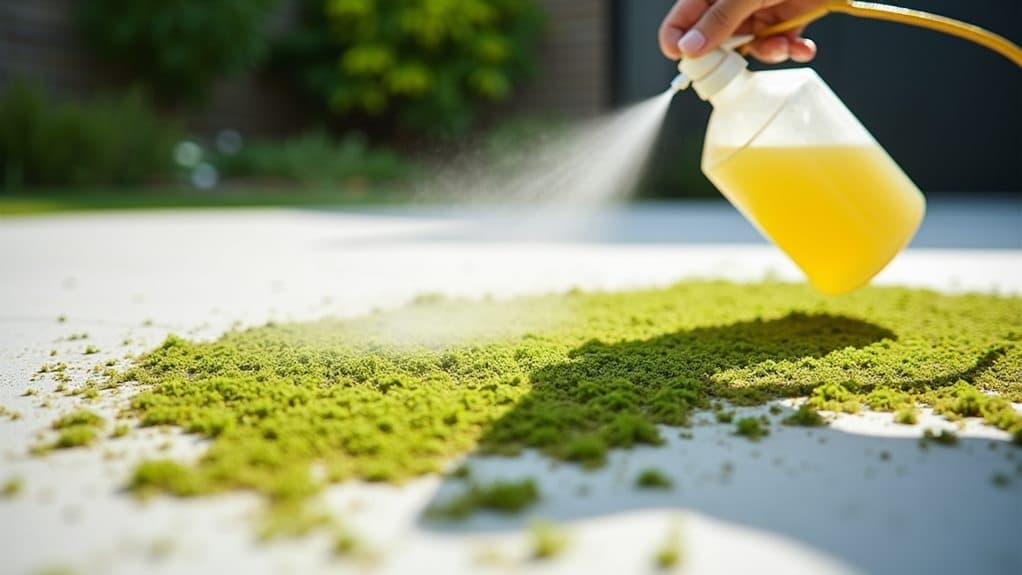
Natural cleaning solutions offer effective moss removal while protecting your resin driveway. Sodium percarbonate works particularly well – simply use 40 grams per square metre mixed with water to kill moss at the roots. Hydrogen peroxide provides an eco-friendly option that delivers lasting moss control.
A simple mixture of white vinegar and water creates an affordable solution that changes the pH to fight moss growth. Just ensure proper dilution to protect your driveway surface.
Another practical option combines bicarbonate of soda with vinegar for powerful moss removal without damaging the resin.
Whilst bleach can tackle moss effectively, you must rinse thoroughly afterwards to prevent any staining or surface damage.
When choosing your cleaning method, think about environmental impact, ease of use and long-term results. Each solution has its merits – pick the one that best suits your needs and budget.
Remember to clean regularly to prevent moss from taking hold in the first place. This saves time and effort in the long run, keeping your driveway looking fresh year-round.
Common Mistakes to Avoid
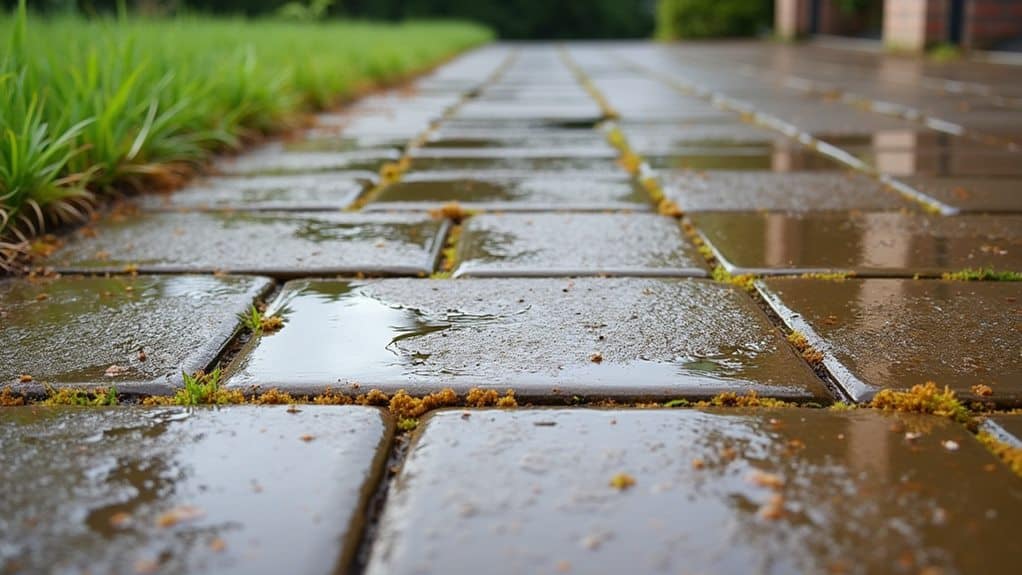
Common Mistakes to Avoid: Resin Driveway Care
Keep your resin driveway in top condition by steering clear of these damaging mistakes when removing moss.
Regular maintenance checks and professional inspections every few years help spot problems early. Think of your driveway like a car – it needs proper care to last.
The biggest risk comes from pressure washing with too much force. Never exceed 150 bar pressure – that’s roughly the strength of a mid-range domestic pressure washer. Keep the nozzle moving and maintain even distance from the surface, just as you’d when cleaning your car.
Avoid these cleaning mistakes:
- Using neat bleach (always dilute and rinse thoroughly)
- Applying harsh acid cleaners that eat away at the surface
- Scrubbing with wire or hard-bristled brushes (use soft to medium-firm brushes instead)
Choose a dry day for moss removal. Wet weather will wash away cleaning solutions before they can work properly, much like trying to wash your windows in the rain.
Follow these guidelines, and your resin driveway should stay moss-free without suffering damage. If unsure, consult your driveway installer or a specialist cleaning company for advice.
Seasonal Moss Control Methods
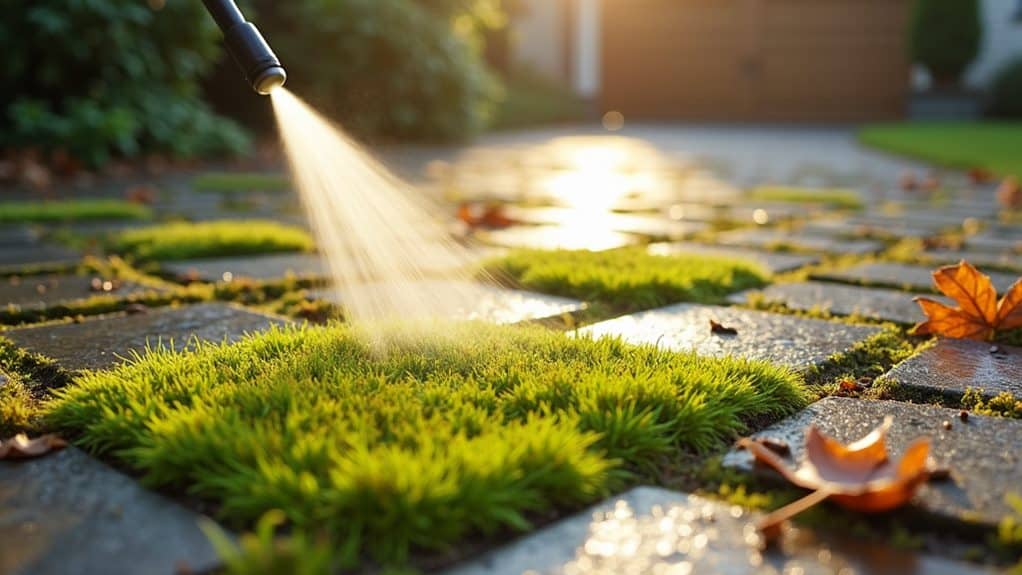
Seasonal moss control on resin driveways requires different approaches throughout the year. Regular sweeping prevents debris build-up, especially during peak moss growth in spring and autumn. Catching problems early helps avoid costly repairs down the line.
Season | Control Method
—|—
Early Spring | Light pressure washing (up to 150 bar)
Late Winter/Early Spring | Apply moss and algae killer (iron sulphate)
Summer | Trim back shrubbery for sunlight exposure
Autumn | Regular debris sweeping
Winter | Annual eco-friendly treatment
Spring maintenance starts with gentle pressure washing to remove surface moss. Apply iron sulphate-based moss killer in late winter or early spring as temperatures rise. During summer, cut back any overhanging branches and bushes to reduce shaded areas where moss tends to grow.
For best results, treat the driveway annually with sodium percarbonate, an environmentally friendly solution that breaks down moss at the root. This methodical approach ensures your resin driveway stays moss-free and well-maintained through all seasons.
Professional Cleaning Recommendations
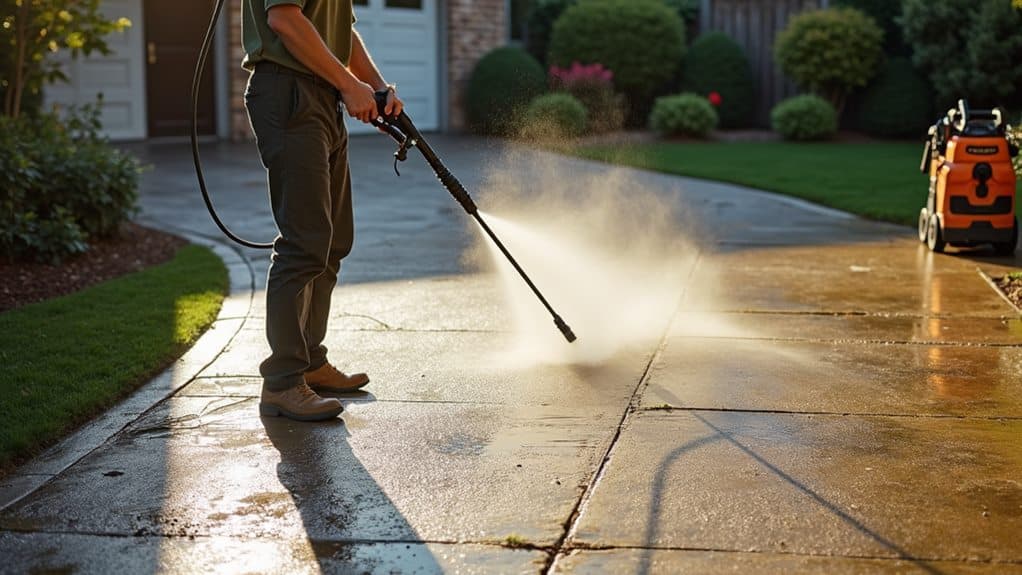
Regular professional moss removal from resin driveways offers clear benefits. Specialists use industrial-grade tools and environmentally-friendly solutions that effectively remove growth whilst protecting your driveway’s surface.
With proper maintenance from professionals, your path could last beyond 25 years. Their expertise ensures safe removal that preserves your investment.
Professional cleaners first assess your driveway for early signs of moss and algae. They use controlled pressure washing at 150 bar with cold water, carefully calibrated to protect the surface whilst removing moss effectively.
For tough spots, they apply specialist moss killers like iron sulphate at the correct strength.
Booking yearly professional cleans helps prevent future moss problems. This routine care keeps your driveway looking smart and reduces slip hazards, particularly important during wet British weather.
Based on your driveway’s location and moisture exposure, cleaners can create a tailored maintenance plan. Their methodical approach, using proper equipment and proven solutions, maintains both the life and look of your resin driveway.
Frequently Asked Questions
How Do You Get Moss off a Resin Driveway?
Use a pressure washer at 150 bar with cold water and a flat nozzle to remove moss effectively. For stubborn patches, apply a mixture of bicarbonate of soda and white vinegar, or opt for a moss killer from your local DIY shop. Regular brushing helps prevent regrowth, particularly during damp autumn months.
What Is the Best Thing to Clean a Resin Driveway With?
For optimal results, use a gentle soap solution and a low-pressure washer (no higher than 150 bar). Regular cleaning with environmentally-friendly products and a fan-type nozzle will maintain your resin driveway’s appearance and durability. Common household detergents work well, but avoid harsh chemicals that might damage the surface.
Will Bleach Damage a Resin Driveway?
Using undiluted bleach will harm your resin driveway. For safe moss removal, always mix bleach with water and rinse properly afterwards. Consider gentler options like white vinegar or specialist resin cleaners to protect your driveway’s finish and durability.
How to Stop Grass Growing Through Resin Driveway?
Regular sweeping, swift crack repairs and eco-friendly weed treatments keep grass at bay on resin driveways. Much like keeping your garden tidy, proper maintenance of both the driveway surface and adjacent lawn prevents unwanted growth and maintains a smart appearance.
Conclusion
Keeping your resin driveway moss-free needn’t be complicated. Set your pressure washer below 2,000 PSI to avoid damage, use gentle cleaning products with a neutral pH, and stick to regular seasonal cleaning. For serious moss problems, it’s worth calling in a professional who knows resin driveways – look for ones with RSPB certification. Regular maintenance throughout the year will help prevent moss from taking hold in the first place.
